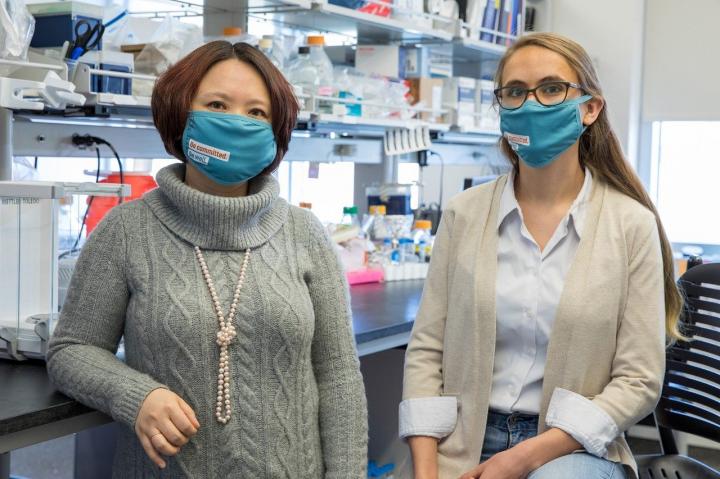
Credit: Andrew Mann, Virginia Tech.
A healthy system of gut bacteria, or microbiota, is crucial to health: Gut bacteria not only aid with digestion, but also play an important role in the body’s immune response. Infants, however, are not born with full-fledged gut microbiota, which makes it difficult for them to fight off intestinal infections.
Although little is known about how the immune system develops during infancy, new research from the Virginia-Maryland College of Veterinary Medicine’s Department of Biomedical Sciences and Pathobiology sheds significant new light on the subject.
A research team from principal investigator Xin Luo’s lab used rodent subjects to show a causal relationship between neonatal antibody production and the mother’s microbiota. The team’s paper, “Regulation of Neonatal IgA Production by the Maternal Microbiota,” was recently published in Proceedings of the National Academy of Sciences (PNAS), the official journal of the National Academy of Sciences.
“Our study identifies the maternal microbiota — harmless bacteria living in mom’s milk, for example — as a source of education for the infant’s antibody response. In particular, we have found that the most abundant antibody in the human body that protects us from infections, IgA, can be educated by a specific bacterium in mom’s milk, Lactobacillus reuteri, which is also a commonly used probiotic,” said Luo, associate professor of immunology in the Department of Biomedical Sciences and Pathobiology.
Studies of IgA production typically focus on adult subjects, without addressing the effects of mothers’ microbiota on the development of the immune response. Conversely, this study examined neonatal mice nursing from dams with different microbiotas and measured the changes in the neonatal mice’s IgA production.
Using germ-free mice from the veterinary college’s gnotobiotic rodent facility, the researchers determined that L. reuteri is one of the neonatal IgA-inducing bacteria in the maternal microbiota. In turn, raising an infant’s IgA production through L. reuteri might result in a more robust immune response to pathogens. Particularly because a strain of L. reuteri isolated from human breast milk was used for the study, the findings have the potential to be translated to human medicine.
“It will be interesting to see if human maternal microbiota have similar mechanisms with mice in educating neonatal immune response, especially the mucosal immunity,” said first author Qinghui Mu (Ph.D. ’18), a postdoctoral fellow at Stanford University’s School of Medicine and former doctoral student in Luo’s lab. “IgA is vital for the prevention of enteric pathogens, and IgA inducible bacteria may be supplemented as probiotics for preventing an infant’s enteric infections.”
The next step is to determine the effects that these newly produced antibodies have on the neonatal immune response. “Early perturbation of microbiota is linked to autoimmune diseases. It’s not completely clear whether the observed immunological changes could affect autoimmune development, but if we can identify microbes that enhance early defenses without setting off self-reactivity, then we could potentially use them to protect infants from infections,” said first author Brianna Swartwout, a Ph.D. candidate in the Translational Biology, Medicine, and Health Graduate Program and a member of Luo’s lab.
The goal of the research, Luo said, is to better understand the benefits of microbes in order to recommend solutions, such as probiotics, that could strengthen the neonatal immune system. These efforts could lead to new strategies in medicine — and healthier babies.
###
Media Contact
Alison Elward
[email protected]
Original Source
https:/




